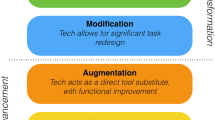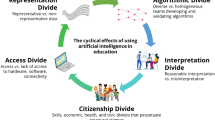Abstract
We examine teachers’ reflections on incorporating digital instructional resources (DIRs) into their mathematics teaching. We analyze qualitative interviews with 39 elementary school teachers from four educational contexts: Belgium, Finland, Sweden, and the U.S., using a framework proposed by Pepin et al. (Int J Math Educ 46: 645-661, 2017) to consider opportunities for DIRs to shift elements of teaching and learning in potentially transformative ways. Teachers described three major domains of teaching practice where they used DIRs: (a) class instruction, (b) student practice, and (c) professional participation. We found that teachers readily used DIRs during class instruction and to support student practice, guided by their existing instructional goals, which were shaped in part by education structures in the context. Few teachers incorporated DIRs in ways that transformed typical learning spaces. We also found that DIRs impacted several aspects of teachers’ professional practices, including professional learning and collaboration. In particular, participation in social media and resource sharing altered the nature of and ways teachers participated in their own professional learning. We assert that efforts to use DIRs to stimulate change need to begin with an understanding of teachers’ current practices and use our findings to identify three potential levers that might support movement toward change.
Similar content being viewed by others
Notes
We did not use school type (public, private, free, etc.) as a selection criterion, as these types are not easily equated across contexts.
One Finnish teacher did not complete the interviews.
References
Choppin, J., Carson, C., Borys, Z., Cerosaletti, C., & Gillis, R. (2014). A typology for analyzing digital curricula in mathematics education. International Journal of Education in Mathematics, Science, and Technology, 2(1), 11–25.
Clarke, D. (2013). The validity-comparability compromise in cross cultural studies in mathematics education. In B. Ubuz, Ç. Haser, M. Mariotti (Eds.), Proceedings of the Eighth Congress of the European Society for Research in Mathematics Education (pp. 1855-1864). Ankara: Middle East Technical University.
Clark-Wilson, A. (2010). Emergent pedagogies and the changing role of the teacher in the TI-Nspire Navigator-networked mathematics classroom. ZDM, 42(7), 747–761.
Daro, P. (2016). Digitally enhancing learning. In M. Bates & Z. Usiskin (Eds.), Curricula in school mathematics (pp. 285–296). Information Age Publishing.
Edson, A. J. (2017). Learner-controlled scaffolding linked to open- ended problems in a digital learning environment. ZDM. https://doi.org/10.1007/s11858-017-0873-5
Gueudet, G., & Trouche, L. (2009). Towards new documentation systems for mathematics teachers. Educational Studies in Mathematics, 71(3), 199–218.
Healy, L., & Lagrange, J. B. (2010). Introduction to section 3. Mathematics education and technology-rethinking the terrain (pp. 287–292). Berlin: Springer.
Hemmi, K., & Ryve, A. (2015). Effective mathematics teaching in Finnish and Swedish teacher education discourses. Journal of Mathematics Teacher Education, 18(6), 501–521.
Hiebert, J., Stigler, J. W., Jacobs, J. K., Garnier, H., Smith, M. S., Hollingsworth, H., Manaster, A., Wearne, D., & Gallimore, R. (2005). Mathematics teaching in the United States today (and tomorrow): Results from the TIMSS 1999 Video Study. Educational Evaluation and Policy Analysis, 27(2), 111–132.
Koljonen, T. (2020). Finnish mathematics curriculum materials and teachers’ interaction with them in two cultural-educational contexts. Doctoral dissertation, Doria: Åbo Academy University (ISBN: 978-952-12-4002-7).
Murphy, R., Gallagher, L., Krumm, A., Mislevy, J., & Hafter, A. (2014). Research on the use of Khan Academy in schools: Implementation report. SRI Education.
Pepin, B., Choppin, J., Ruthven, K., & Sinclair, N. (2017). Digital curriculum resources in mathematics education: Foundations for change. The International Journal on Mathematics Education (ZDM), 49(5), 645–661.
Pepin, B., Gueudet, G., & Trouche, L. (2013). Re-sourcing teachers’ work and interactions: A collective perspective on resources, their use and transformation. The International Journal on Mathematics Education (ZDM), 45(7), 929–945. https://doi.org/10.1007/s11858-013-0534-2
Remillard, J. T. (2005). Examining key concepts in research on teachers’ use of mathematics curricula. Review of Educational Research, 75(2), 211–246.
Remillard, J. T. (2016). Keeping an eye on the teacher in the digital curriculum race. In M. Bates & Z. Usiskin (Eds.), Curricula in school mathematics (pp. 195–204). Information Age Publishing.
Remillard, J. T. (2018). Examining teachers’ interactions with curriculum resource to uncover pedagogical design capacity. In L. Fan, L. Trouche, C. Qi, S. Rezat, & J. Visnovska (Eds.), Recent advances in research on mathematics teachers’ textbooks and resources (pp. 69–88). Springer.
Ruthven, K. (2018). Instructional activity and student interaction with digital resources. In L. Fan, L. Trouche, C. Qi, S. Rezat, & J. Visnovska (Eds.), Research on mathematics textbooks and teachers’ resources: advances and issues (pp. 261–275). Springer.
Ruthven, K., Deaney, R., & Hennessy, S. (2009). Using graphing software to teach about algebraic forms: A study of technology-supported practice in secondary-school mathematics. Educational Studies in Mathematics, 71(3), 279–297.
Stigler, J., & Hiebert, J. (1999). The teaching gap: Best ideas from the world’s teachers for improving education in the classroom. The Free Press.
Tobin, J., Hsueh, Y., & Karasawa, M. (2009). Preschool in three cultures revisited. University of Chicago.
Tour, E. (2017). Teachers’ self-initiated professional learning through personal learning networks. Technology, Pedagogy, and Education, 26(2), 179–192.
van Bommel, J., Randahl, A.-C., Liljekvist, Y., & Ruthven, K. (2020). Tracing teachers’ transformation of knowledge in social media. Teaching and Teacher Education, 87, 102958.
Yerushalmy, M. (2006). Slower algebra students meet faster tools: Solving algebra word problems with graphing software. Journal for Research in Mathematics Education, 37(5), 356–387.
Yerushalmy, M. (2013). Designing for inquiry in school mathematics. Educational Designer, 2(6), Article 22. http://www.educationaldesigner.org/ed/volume2/issue6/article22.
Funding
This research was funded by Swedish Research Council, Grant Number 2016-04616. All opinions are those of the authors and do not necessarily represent the views of the funder.
Author information
Authors and Affiliations
Corresponding author
Additional information
Publisher's Note
Springer Nature remains neutral with regard to jurisdictional claims in published maps and institutional affiliations.
Appendix A: Online student facing platforms
Appendix A: Online student facing platforms
Region | DIR | Student Guidance | Customization | Content description |
|---|---|---|---|---|
FI | TT online | Textbook | Levels of difficulty | Curriculum program |
YN online | Textbook | None | Curriculum program | |
Bingel | Videos | Adaptive, Task assignment and reports | Aligned to national core curriculum | |
Ville | None | Adaptive, Task assignment and reports | Skills practice | |
10Monkeys | None | Reports | Skills practice | |
Ekapeli | Modeling | Adaptive learning path | Skills practice | |
Vektor | None | None | Cognitive development | |
FL | Bingel | Videos | Adaptive, Task assignment and reports | Aligned with NP |
Gynzy | None | Adaptive, Task assignment and reports | Skills practice | |
Ambrasoft | None | Adaptive, Task assignment and reports | Skills practice | |
SW | FM online | Textbook | Levels of difficulty | Curriculum program |
Bingel | Videos | Adaptive, Task assignment and reports | Aligned with MD | |
Edqu.se | Videos, feedback on errors | Task assignment/creation, reports (with subscription) | Aligned to national core curriculum | |
Studi.se | Videos | None | Aligned to national core curriculum | |
Nomp | None | Task assignment/creation, reports (with subscription) | Aligned to national core curriculum | |
Multi | None | Adaptive | Skills practice | |
King of Math | None | Adaptive | Skills practice | |
Elevspel | None | None | Skills practice | |
Klockgården | None | None | Skills practice | |
Gruvan | None | None | Skills practice | |
Affären | None | None | Skills practice | |
10Monkeys | None | Reports | Skills practice | |
US | EM: ConnectEd | Interactive textbook | None | Curriculum program |
Zearn | Videos, hints, scaffolded support | Reports | Aligned with EK | |
Compass Pathblazer2 | Hints, explanations | Learning path, task assignment | Aligned with CCSS | |
First in Math | Explanations | Adaptive, task assignment | Aligned with CCSS | |
IXL | Explanations | Adaptive, task assignment and reports (with subscription) | Aligned with CCSS | |
Study Island | Videos, explanations | Adaptive, task assignment and reports | Aligned with CCSS | |
Dreambox | None | Learning path, reports | Aligned with CCSS | |
SumDog | None | Reports | Skills practice | |
BigBrainz | None | Reports | Skills practice |
Rights and permissions
About this article
Cite this article
Remillard, J.T., Van Steenbrugge, H., Machalow, R. et al. Elementary teachers’ reflections on their use of digital instructional resources in four educational contexts: Belgium, Finland, Sweden, and U.S.. ZDM Mathematics Education 53, 1331–1345 (2021). https://doi.org/10.1007/s11858-021-01295-6
Accepted:
Published:
Issue Date:
DOI: https://doi.org/10.1007/s11858-021-01295-6




